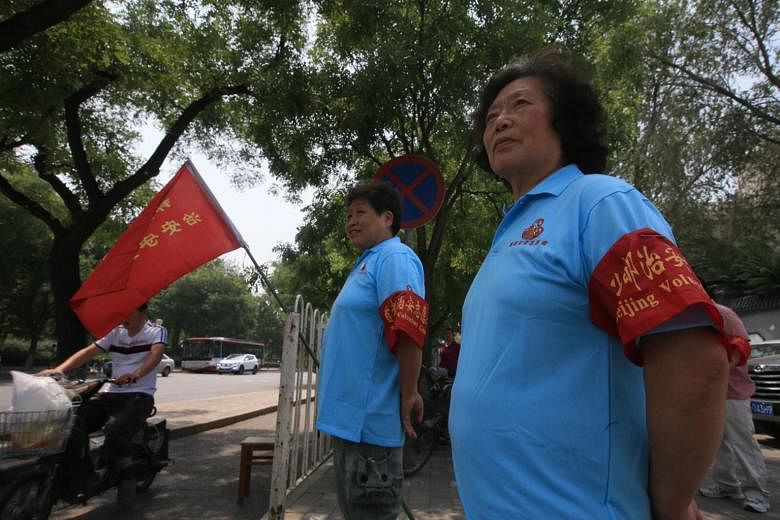Madam Yu Jie may be a 60-year-old retiree, but three times a week, she patrols her neighbourhood in Beijing's eastern Chaoyang district for anything suspicious or awry.
Wearing a red armband with "public security volunteer" written on it, she meticulously notes down cars with missing licence plates and looks out for unfamiliar faces in the Liufang community where she has lived for the past 30 years.
"Cars like these are suspicious because they don't belong here. We report them to the sub-district office... I've also reported incidents of high-rise littering. As a volunteer, we want to keep the environment safe because it's our home," she told The Straits Times.
Residents of Chaoyang district like Madam Yu are increasingly becoming intelligence-gathering heroes in the fight against crime.
They gained fame on social media after being credited by police for their tip-offs, which have led to a string of high-profile celebrity drug arrests since last year.
Their contributions elicited light-hearted comments that the district's residents resemble a top-tier intelligence agency. Chao- yang rounds off the world's top five agencies after the United States' Central Intelligence Agency, the Soviet-era KGB, Israel's Mossad and British security service MI6 - that is the joke making its rounds online.
It has even been bestowed with its own unwieldy acronym: BJCYQZ, which stands for "Beijing Chaoyang Qunzhong".
Chaoyang is the largest of Beijing's eight districts, with a population of 3.8 million in 2013. An estimated 3 per cent - about 110,000 people - have been roped in as community volunteers, local reports say.
Since last year, there have been at least nine arrests of famous personalities there, many of which were due to tip-offs. According to the police, Chinese actor Zhang Bo, for instance, was arrested after a tip-off. He later tested positive for crystal methamphetamine.
But Chaoyang's crime-busters - mostly retired volunteers who conduct regular patrols and report suspicious activities to the police- are not just busting drug offences.
They have alerted the police to prostitution activities - famous micro-blogger Charles Xue and actor Huang Haibo were arrested for solicitation. Illegal construction, fire hazards and unlicensed taxis have also not escaped their attention.
Mr Zeng Yuanpeng, who is in charge of volunteers in the Hujialou community in Chaoyang district, said many volunteers are enthusiastic as they have a vested interest in keeping their neighbourhoods safe.
"By tapping on the public's efforts, we are able to expand our resources beyond that of the police and other security forces, which are limited in number," he added.
According to media reports, the sub-district administration offices across Beijing are responsible for organising volunteers. They may recruit residents by giving them a token sum of about 20 yuan (S$4.40) a day. Suspicious incidents are brought to the office's attention first, and reported to the police only when necessary.
But some residents have complained online about being under constant watch and also about the nosy behaviour of some of the elderly volunteers. However, most of the residents The Straits Times spoke to were supportive of the scheme.
Sales manager Yang Li, 34, said it was reassuring to know the volunteers were also keeping an eye out for her son when he played outside.
"It also gives the retirees a way to pass their free time and to continue contributing to the community," she added.
The efforts of Chaoyang's volunteers have been acknowledged by the authorities. The Beijing Public Security Bureau said on its Weibo microblog in May: "The people of Chaoyang district are... admirable for helping the police search for clues, and check for risks in transportation, public security or fire control. Everyone can contribute."
Other districts are also pulling their weight. Beijing police have received more than 1,500 drug-related tip-offs since the start of the year, reports say. This is 65 per cent more than the year before.
Some 240 of these saw more than 260 people arrested. Film actor Jackie Chan's son Jaycee, for instance, was one of the most high-profile celebrities detained on drug charges in Dongcheng district last year following a tip-off.
Since March last year, Beijing police have started offering rewards to those who provide valuable information on terror-related crimes. Some of the more than 800 tip-offs received have helped solve cases related to illegal transportation of guns and explosives and the instigation of terrorist attacks.
Experts say it is not uncommon for countries to rope in the public to assist in law enforcement, though each country has its own way of doing so.
In China, the mass line campaign - a party policy under Mao Zedong aimed at broadening and cultivating contacts with the masses of people to strengthen the Communist Party's leadership role - has meant that the idea of gathering support from the masses has become part of the country's psyche, Renmin University security expert Guo Tai-sheng told The Straits Times.
"To govern such a large country like China, it is very important to have support from the grassroots," he said. "Especially in terms of crime prevention and preventing terror attacks... it will not only reduce the workload on the police but also show the civic-mindedness of the people."
esthert@sph.com.sg
•Additional reporting by Carol Feng

